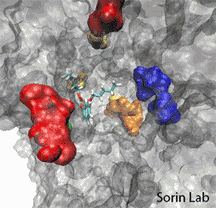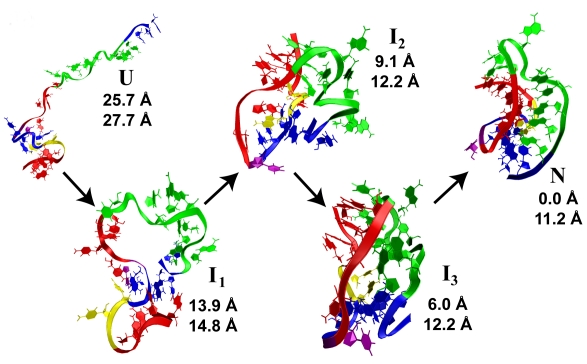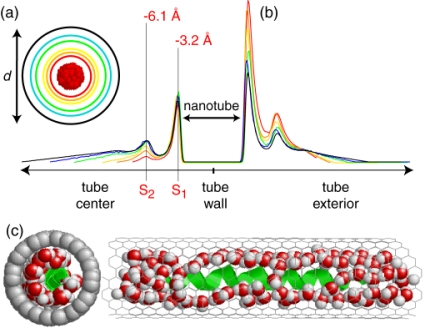


Computational Biochemistry & Biophysics
Research in the Sorin Lab focuses on using molecular modeling and simulation to examine the structure and dynamics of biological molecules of varying sizes and chemical compositions. The Folding@Home Distributed Computing network allows us to use hundreds of thousands of personal computers donated by clients from around the world to run large numbers of molecular simulations, giving us the ability to predict ensemble average kinetic, thermodynamic, and structural/mechanistic properties, and thereby bridging the gap between single-molecule and bulk experimental measurements. A brief overview of our current projects is listed below.
 Protein-Drug Interactions
Protein-Drug Interactions
How do drug molecules interact with their target proteins? Our studies into this area seek to offer a molecular picture of the ways in which known inhibitors of varying activities interact with the acetyl- and butylcholinesterase enzymes (AChE and BChE), which have been implicated in Alzheimer's disease and a number of other human health conditions. The question posed above is a fundemental aspect of pharmaceutical knowledge and drug design that we hope to address both qualitatively and quantitatively.
Click here to visit our BChE inhibition page ...
selected simulation movies are available for viewing. RNA Folding, Misfolding, & Function
RNA Folding, Misfolding, & Function
The folding of nucleic acids is an intriguing problem due to the structural and chemical differences in comparison to proteins. The highly charged nature of nucleic acids presents several challenges in computational modeling of these biopolymers. We have studied the folding of small RNAs using atomistic models, while employing refined minimalist models to study the folding of larger RNA systems. Many questions remain regarding the assembly, structural stability, and dynamics of nucleic acids at many levels. Protein Folding, Misfolding, & Function
Protein Folding, Misfolding, & Function
Proteins are biology's workhorses, or "nanomachines." Before proteins can carry out their important functions they must assemble, or "fold." The process of protein folding, while critical and fundamental to virtually all of biology, in many ways remains a mystery. Moreover, when proteins do not fold correctly (i.e. when they "misfold"), there can be serious consequences, including a number of human diseases, such as Alzheimer's, Mad Cow (BSE), CJD, ALS, Huntington's, Parkinson's disease, and many cancers and cancer-related syndromes. Effects of Solvation on Protein and RNA Folding & Function
Effects of Solvation on Protein and RNA Folding & Function
Solvation plays a pivotal role in both the kinetics and thermodynamics of folding. We have studied such effects for small proteins and RNAs, showing that implicit representations of aqueous solvent may miss key effects that explicit models capture, including a dependence of secondary structure on the hydrophobic nature of the solute-solvent interface. Better modeling methods are always on the horizon, and improving upon current solvation models or generating new ones is of great interest.
 |
|
 |
